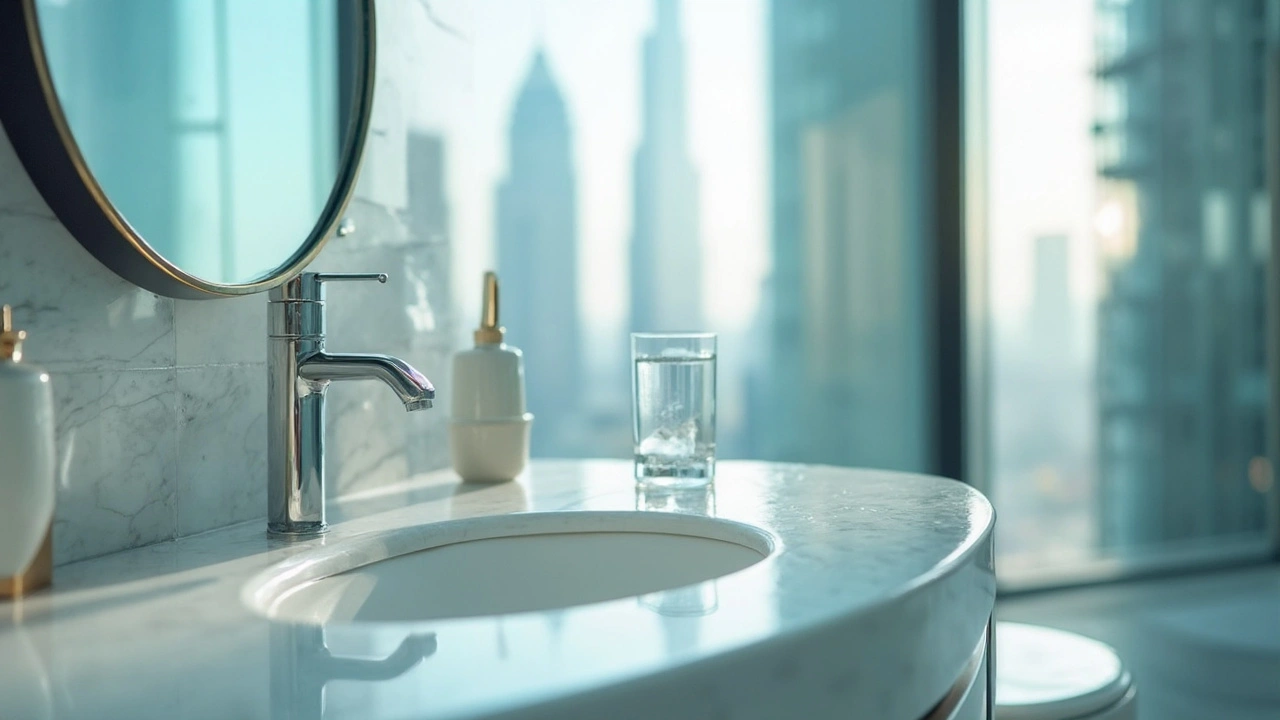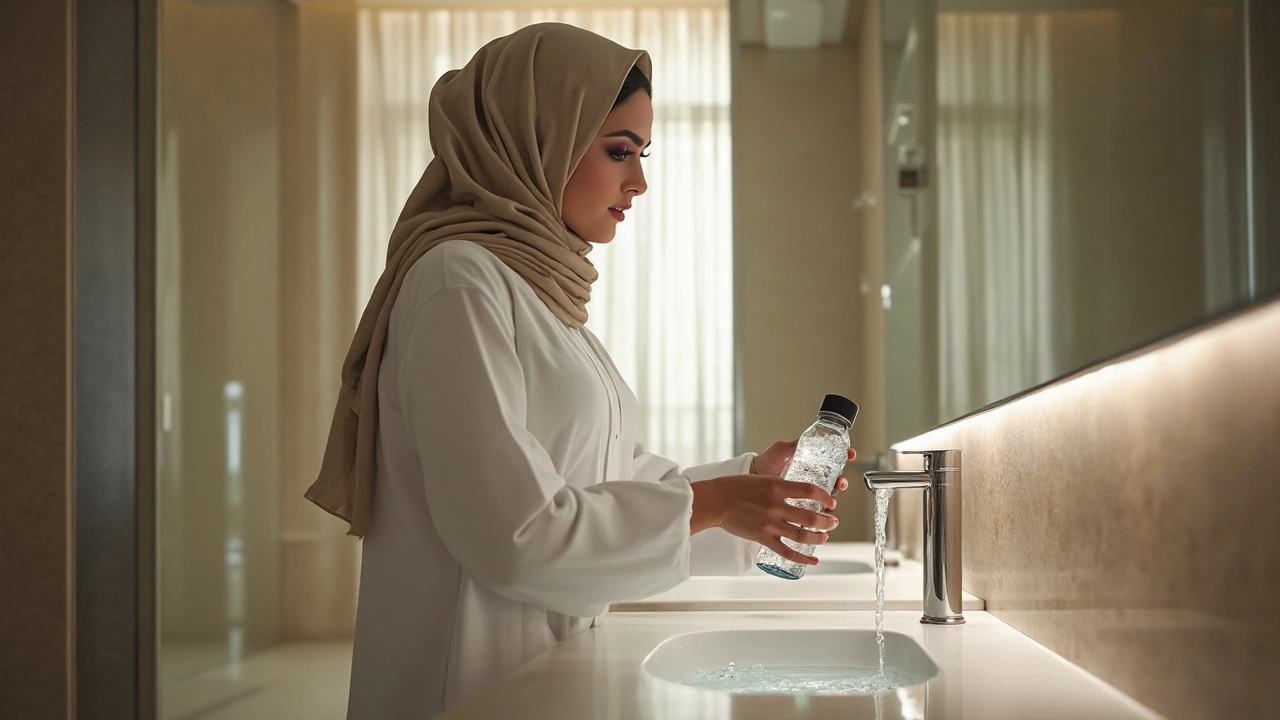Is it Safe to Drink Water from the Bathroom in Dubai? What You Need to Know
 Apr, 24 2025
Apr, 24 2025
Standing in a glossy Dubai hotel bathroom, parched after a long night out, it’s tempting to fill your glass right from the tap. But is bathroom water in Dubai safe to drink—or should you think twice before taking that sip?
The city’s tap water actually starts out as some of the world’s most purified. Dubai doesn’t rely on lakes or rivers for its supply. Almost all water here comes from giant desalination plants, where seawater gets turned into drinkable water using world-class technology. That means, according to Dubai’s government, what comes out of the main pipes reaches high international safety standards.
Still, things aren’t always that straightforward—especially when you consider pipes and storage tanks in older buildings, and the difference between what’s piped to the kitchen and what splashes out of the bathroom tap. Just because water leaves the plant super clean doesn’t mean it always stays that way by the time you use it.
If you’re spending nights at upscale hotels, regular hotels, or sharing apartments as an escort in Dubai, knowing where your water comes from—and what’s happened to it along the way—makes a real difference for your health. Let’s break down what to expect and how to stay safe.
- Dubai’s Water Supply: What’s Actually in Your Tap
- Bathroom vs Kitchen Tap: Where’s the Difference?
- Risks and Realities: Should You Drink the Water?
- Best Practices for Safe Drinking When Out Escorting
Dubai’s Water Supply: What’s Actually in Your Tap
Most folks in Dubai have no clue how their tap water safety story starts. Nearly all the water you get in your apartment, villa, or hotel room comes straight from the sea. Dubai uses giant desalination plants, which basically clean saltwater so well you could call it near-lab grade.
The main players here are the Jebel Ali and Al Zawra plants. These are high-tech facilities—think massive machines using heat and membranes to strip salt and impurities out. After desalination, the water passes through more filters and gets a precise dose of chlorine to kill germs. The government says it’s checked every day and is clean enough to drink by the time it leaves the plant.
| Source | % of Dubai’s Tap Water | Treatment |
|---|---|---|
| Desalinated Seawater | ~99% | Membrane (RO), Filtration, Chlorination |
| Groundwater | <1% | Filtration, Chlorination |
Before it reaches your tap, this water travels through city pipes and sometimes sits in your building’s storage tanks. Here’s where things sometimes get dicey. If those tanks aren’t cleaned regularly, stuff like sand or even bacteria can sneak in, especially in older buildings or budget apartments. That’s why hotel chains and new builds usually have better water quality Dubai than some older towers out in quieter areas.
- Dubai’s water has no taste or weird smell if pipes and tanks are clean.
- Chlorine levels are low—so you won’t get that swimming pool vibe.
- The water is safe at the source, but always think about what happens after it leaves the big plants.
Dubai’s system is better than many cities globally, and you’re unlikely to face rusty, lead-filled water like in some countries. But the catch is: even top-tier water can pick up problems before it reaches your bathroom tap.
Bathroom vs Kitchen Tap: Where’s the Difference?
If you think all taps in your hotel or apartment give you the same Dubai bathroom water, you’re only half right. Citywide, both kitchen and bathroom taps get the same basic supply—water that’s passed through strict filtration at Dubai’s famous desalination plants. That’s the good news.
The twist comes later. In many Dubai buildings—especially older apartments or budget hotels—the water runs through different sets of pipes and tanks before it hits your bathroom or kitchen. The paths aren’t equal. Kitchen taps are often hooked up to newer pipes and cleaner storage because that water’s meant for cooking and drinking. Bathrooms sometimes get the older, less-used parts of the system.
Even in fancy hotels, you’ll notice most people—staff included—won’t drink straight from the bathroom tap. Why? The most common reasons are:
- Longer, older piping routes for bathrooms
- More chance of bacteria or mold from rarely-cleaned storage tanks
- Possible mix of hot and cold water pipes, which aren’t always food grade
Want some quick insight? Here’s what you need to know about the differences:
| Kitchen Tap | Bathroom Tap | |
|---|---|---|
| Pipe Quality | Usually newer, shorter | Sometimes older/less maintained |
| Storage Tank | Regularly cleaned | Not always cleaned/often forgotten |
| Water Use | Mostly for drinking/cooking | Mostly for washing/flushing |
So, even though the original tap water quality in Dubai is high, what comes from your bathroom tap is less safe compared to your kitchen tap. If you’re feeling thirsty after a late shift, grab your glass from the kitchen, not the bathroom. And if you’re ever in doubt, use bottled water for drinking or brushing your teeth. That’s honestly what most locals do every day—just to be on the safe side.

Risks and Realities: Should You Drink the Water?
Here’s the truth: while Dubai bathroom water starts out super clean, the real risk comes later—through the building pipes and water tanks. Dubai’s official tap water is safe at the source, but once it travels through old pipes, or sits in rooftop tanks for days, things can change. For most modern high-rises and good hotels, regular maintenance keeps things pretty safe. But not everywhere in the city does a stellar job on cleaning out those tanks or replacing rusty pipes.
The difference between bathroom and kitchen taps often comes down to plumbing. In some buildings, kitchen taps are connected straight to the main line, while bathroom taps might pull from a tank that’s not cleaned out as often. That means bathroom tap water could pick up more bacteria, rust, or pipe residue than what you get in the kitchen—even if both start off the same.
Here’s a useful overview to compare potential risks:
| Location | Main Risks | Likelihood |
|---|---|---|
| Hotel Bathroom | Pipe residue, stale tank water | Low in luxury hotels, higher in old buildings |
| Apartment Bathroom | Bacteria, unclean tanks, lead from old pipes | Moderate, depends on age/maintenance |
| Kitchen Tap | Generally cleaner, but still tank risk | Lowest, but not zero |
If you’re an escort in Dubai, you’re often at the mercy of wherever you’re staying—a five-star suite, serviced apartment, or somewhere more budget. Don’t just trust what looks shiny. Ask hotel or apartment staff when tanks and pipes were last cleaned. Most top hotels test their water regularly—if they can show you a certificate, even better.
- If the water smells funny or looks cloudy, don’t drink it. Dubai water should be clear and have nearly no odor.
- Bottle water is cheap and everywhere, so most escorts and travelers just play it safe, especially with bathroom water Dubai taps.
- Brush your teeth and showering? No biggie. Swallowing a glass is a different story, especially in older buildings.
- Smart trick: if you have to drink tap water, fill from the kitchen cold tap, not the bathroom, and run it for a minute before you fill your glass. This flushes out what’s been sitting in the pipes.
Bottom line? Safe drinking water in Dubai is easy to find if you stick with bottled, or if you know your building keeps its plumbing spotless. But with tap water safety in bathrooms, better to play it cautious than end up with an upset stomach—or worse, explaining why you missed a booking.
Best Practices for Safe Drinking When Out Escorting
If you’re in Dubai working as an escort or just on the move a lot, staying hydrated is more than just a comfort—it's a must. But not every tap is equal, and Dubai bathroom water can have surprises depending on building age and maintenance.
First thing: most locals, expats, and seasoned travelers don’t drink tap water straight from the bathroom in Dubai, even though the official supply is safe at the source. Old pipes and tanks can mean extra risk. So what’s the safest bet?
- Go for bottled water: This is the default choice. Nearly every hotel, club, and private apartment in Dubai stocks it. A basic 500ml bottle usually costs under 2 AED (about $0.50 USD) in stores. Staying somewhere longer? Look for 5-gallon water dispensers, which are popular and delivered to your door for around 15 AED.
- Use kitchen tap over bathroom tap: If you must use tap water, the kitchen supply is often a better pick. Kitchens are more likely to be connected directly to the main water supply, while bathrooms sometimes pull from rooftop tanks, which can be less clean.
- Check for water filters: Some modern hotels and apartments have filtration systems. Ask reception or your host if there’s a filtered tap, especially in the kitchen. When in doubt, stick to bottled.
- Carry a reusable bottle: This helps avoid plastic waste and lets you refill safely if you spot filtered water coolers at gyms or lounges (common in Dubai malls and upscale offices).
- Mind the ice: Always check where the ice comes from, especially when offered complimentary drinks. Most bars and restaurants use filtered or bottled water, but don’t assume—ask if you’re not sure.
If you're in a pinch and need to use tap water, boil it first. This isn’t super common in Dubai, but it's a smart move if bottled water isn’t an option. Boiling for three minutes kills off bacteria and most viruses that could sneak in from older plumbing.
Out on longer dates or events? Stash a bottle or two in your bag. Dubai's heat can creep up on you fast, especially in summer, when temps shoot past 40°C (104°F). Dehydration isn’t just uncomfortable—it affects how you feel and perform on the job.
Here’s a quick comparison of hydration options escorts typically use in Dubai:
| Source | Safety | Cost | Convenience |
|---|---|---|---|
| Bottled water | Very safe | Low | High |
| Kitchen tap (filtered) | Safe | Free/negligible | High (if available) |
| Bathroom tap | Risky | Free | High |
| Public coolers (with filters) | Safe | Free | Medium |
Take care of your water choices, and you won’t have to worry about surprises from drinking tap water—whether you’re winding down after a gig or just getting ready for the next one.
Dubai Escort